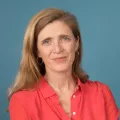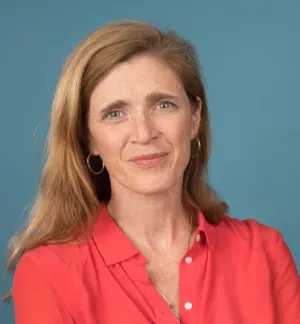
Years from now, when Syrians and the world look back on the country’s horrific crisis, they will remember which countries stepped up to help people in dire need, and which countries did little or nothing at all. And when they do, they will remember Kuwait – not only for giving so generously, but also for repeatedly bringing the international community together to rally support. So while we thank our hosts today, we know that words cannot capture the impact that Kuwait has made on the lives of Syrians.
We also extend our thanks to the UN Secretary General Ban Ki-moon, for your compassionate leadership on behalf of the Syrian people.
Al Houleh, a small town in north Homs, has been under siege by the Asad regime for three years. For its ninety thousand residents, the town only has one general surgeon. Supplies can only be brought into the city on foot, by donkey, or using small boats to cross Lake Houleh. Locals call the journey “the death path,” because, as a doctor there said, “Whatever reaches us is covered in the blood of the people who have risked their lives to get it there.”
The town doctor recounted how a sixty-year-old man whose heart had stopped was brought to Al Houleh’s hospital. With no modern equipment, the only way to keep oxygen flowing to his lungs was by using an old-fashioned, manually operated device. A nurse or doctor would squeeze a bag at regular intervals, which pumped air into the old man’s lungs. They squeezed, he breathed. If they stopped, he died. His life was, literally, in their hands.
In another hospital in Aleppo, a small boy named Marwan was laid out on an operating table in a basement. A barrel bomb dropped by the regime had killed his mother and sister, and taken his legs. Suddenly, the electricity went out and the room went dark. A nurse pulled out her cellphone, directing its light on Marwan’s wounds; other nurses followed. And the surgeon continued to operate by the light of cellphones.
More than four years after the conflict began, people across Syria are struggling to survive in a state of perpetual siege. We all know the numbers. Half of Syria’s pre-war population has been displaced. More than 12.2 million people inside Syria now need humanitarian assistance, including 5.6 million children. 5.6 million kids, and that is just inside Syria.
And beyond Syria’s borders, there are nearly four million Syrian refugees – more than the entire population of the country of Kuwait. One in four people in Lebanon is a Syrian refugee. In Jordan, nearly a hundred schools now devote half their day to teaching Jordanian children, and the other half to teaching Syrian refugee children. Turkey is sheltering a staggering 1.7 million refugees.
The needs are growing by virtually every measure; the UN’s humanitarian appeal for Syria this year is $8.4 billion, the largest in history, and $3.4 billion more than last year’s appeal. Yet too many countries are giving the same amount, or even less than they have in the past. And as more people need help, we are reaching a smaller share of them.
International humanitarian organizations and their partners in Syria are risking their lives to try to get help to those who need it most. Yet their courage and innovation is not enough. Even as the region is convulsed by many other serious challenges, we must never grow used to the suffering of the Syrian people. No matter what else is going on, addressing the plight of Syrians must remain at the top of our agenda.
Countries must close the widening gap between what we are providing and what the Syrian people desperately need. That is why President Obama sent me here today to announce that the United States is pledging $507 million, in addition to the nearly $3.2 billion we have provided since the conflict began. [Applause] We are directing this aid to help meet Syrians’ immediate needs, such as treating more than 2 million patients in U.S.-supported hospitals and clinics, and feeding nearly 7 million people. And today’s pledge comes on top of the substantial bilateral assistance we are giving to Syria’s generous neighbors, who are hosting millions of refugees who are placing a huge strain on overstretched health and education systems.
Today, we are calling on more countries to step up support for efforts like these, and on those countries that have already made generous contributions to do more. The greatest humanitarian crisis in a generation demands the response of a generation.
Syria’s neighbors have shown remarkable generosity in taking in refugees, and we strongly urge them to keep their borders open. Every nation has a legitimate interest in screening the people entering its territory; at the same time, all must work to ease restrictions that prevent the most vulnerable from reaching a refuge. To relieve the burden on Syria’s neighbors, other countries – including the United States – must welcome displaced Syrians in greater numbers.
Providing more aid is not enough – we must ensure that the Asad regime stops blocking and delaying it. Consider interagency convoys, which aim to reach the hardest-hit areas and most isolated places. This year, the regime has denied 30 of the United Nations’ 33 requests for such convoys, despite the UN Security Council Resolution mandating such deliveries. This cannot be allowed to go on.
If our objective is not only to help Syrians today – but to ensure that, a year from now, we are not rattling off even higher numbers of people in need, even more of whom the regime prevents us from reaching – the international community must recognize that this is not merely a conflict that affects civilians. It is a war waged by an Asad regime that deliberately targets civilians, and seems to make choices on the basis of how best to increase human suffering.
How else are we to understand a regime that, according to the Syrian Network for Human Rights, dropped nearly 2,000 barrel bombs between February 2014 and February 2015 – killing at least 6,480 people this way, 95 percent of whom were civilians? What other conclusion can we draw from a regime that tortures thousands of people to death in its prisons, assigning each detainee a serial number?
How else can we see the footage of three tiny children from Sarmin, lying motionless on operating tables, victims of one of multiple chemical attacks reported in Idlib province this month which all evidence suggests the Asad regime perpetrated?
Now, violent extremist groups like ISIL have also committed horrific atrocities against Syrians – including mass rapes of women and girls, and executions of entire communities for what they believe. We have seen the threat this group poses far beyond Syria’s borders, from Tikrit to Tunis. That is why the United States is helping lead a global coalition, together with many allies gathered here, to degrade and ultimately destroy ISIL. But we must remember that the dramatic rise of ISIL and other terrorist groups in Syria would never have been possible without the Asad regime’s atrocities, which continue to be ISIL’s best recruiting tool.
Partnering with Asad will not help us defeat ISIL – it will only make ISIL stronger. The only way out of this escalating spiral of violence is a political solution. As President Obama has repeatedly said, the only viable political solution is one without Asad in power.
However, rather than press for Asad’s departure, certain governments have provided support that has not only kept his regime afloat, but willfully strengthened it. It is no secret that some governments have provided the helicopters and weapons the regime uses to attack civilians. They have helped the regime track down independent journalists and human rights defenders, who are then imprisoned, tortured, or killed.
They vetoed a Security Council resolution that would have referred the orchestrators of mass atrocities to the International Criminal Court. By partnering with Asad, these countries make themselves partners in the regime’s atrocities.
At the outset, I spoke about a doctor who was operating on a boy wounded by a barrel bomb when the electricity went out. By the light of cellphones, the doctor finished the operation and saved Marwan’s life. The first thing Marwan asked on coming out of surgery was –“Will I be able to go to school anymore?”
I also told you about a man who was brought to a field hospital in Al Houleh, whose heart had stopped beating and who had fallen into a coma. As you’ll remember, the only way doctors could keep him alive was by using a pump to squeeze air into his lungs. For the entire first day, the doctors and nurses took turns pumping. And when he did not wake, they kept pumping through the night, and then a second day, and a second night. We take around 15 breaths a minute; their hands provided every one of this man’s breaths. And then, after around 60 hours of pumping – some 55,000 breaths – the man opened his eyes and he began to breathe. And he asked: “Where is my wife?”
That old man and Marwan survived because their doctors and nurses refused to give up on them; because they believed their lives were worth fighting to save. In spite of such efforts, far too many Syrians have not survived, and millions more have endured cruelty and suffering that no one should be asked to bear. Yet there is no more powerful rebuke to the Asad regime’s disregard for human life than the actions of Syrians like those doctors and nurses. For all that Asad has taken away from the Syrian people during this conflict, he has not been able to extinguish their deepest, most noble human longing: to save a life.
These individuals are our true partners in Syria. They are the people who most need immediate assistance and upon whose behalf we must press, relentlessly and with immense urgency, to find a political solution – no matter how elusive it may seem at times. They are the people who, in a Syria one day free of the ruthless grip of Asad and the terrorists, will eventually rebuild a nation out of the ruins. And while today they are doing all they can to keep Syria breathing, they cannot do it alone.
Thank you.
###
Power, Samantha. “Remarks by Ambassador Samantha Power at the Third International Humanitarian Pledging Conference for Syria, Kuwait City, Kuwait.” March 31, 2015


